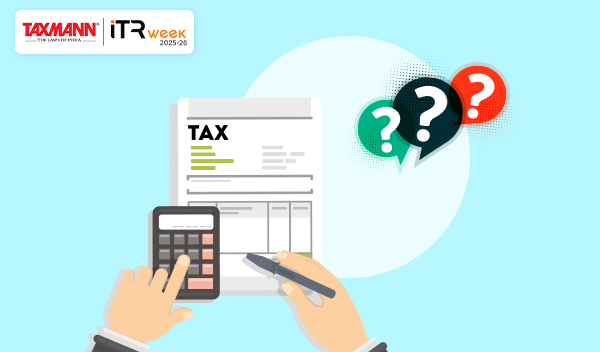[FAQs] Income Tax Returns (ITR) | Set Off and Carry Forward of Losses under Income Tax Act – House Property | Capital Loss
- ITR Week 2025-26|Blog|Income Tax|
- 2 Min Read
- By Taxmann
- |
- Last Updated on 15 September, 2025

Set Off and Carry Forward of Losses under the Income Tax Act refers to the adjustment of losses incurred under one head of income against income from other heads and, if not fully absorbed, carrying them forward to future years. For example, a house property loss up to ₹2,00,000 can be set off against salary income in the same year, while the balance is carried forward. Similarly, capital losses can only be set off against capital gains and, if unutilized, may be carried forward for up to eight assessment years. These provisions ensure fair tax treatment by allowing taxpayers to adjust genuine losses across assessment years.
FAQ 1. I Have Earned a Salary Income of Rs. 800,000 and Have Incurred a Loss of Rs. 300,000 From House Property. Can I Offset This Loss Against My Salary Income?
According to Section 71 of the Income Tax Act, losses from house property can be set off against other income. However, there is a limitation on the amount that can be set off. Specifically, you can only offset a maximum of Rs. 200,000 of your house property loss against your salary income in any given assessment year. Therefore, you can adjust Rs. 200,000 of your house property loss against your salary income, and the remaining Rs. 100,000 loss will need to be carried forward to subsequent years for set-off.
| Read More Inter-head Adjustment on Taxmann.com/Practice |
FAQ 2. I Have a Long-Term Capital Loss of Rs. 70,000 From the Sale of Listed Equity Shares. Can I Set Off or Carry Forward This Loss?
Section 112A of the Income Tax Act provides a concessional tax rate of 12.5% on long-term capital gains arising from the sale of certain securities if the gains exceed Rs. 1.25 lakh.
The new section 112A provides for the taxability of long-term capital gains above Rs. 1.25 lakh. As a gain of up to Rs. 1.25 lakh is not chargeable to tax, it could not be called exempt income. Therefore, any long-term capital loss arising from the sale of listed equity shares can be set off and carried forward to future years.
Disclaimer: The content/information published on the website is only for general information of the user and shall not be construed as legal advice. While the Taxmann has exercised reasonable efforts to ensure the veracity of information/content published, Taxmann shall be under no liability in any manner whatsoever for incorrect information, if any.

Taxmann Publications has a dedicated in-house Research & Editorial Team. This team consists of a team of Chartered Accountants, Company Secretaries, and Lawyers. This team works under the guidance and supervision of editor-in-chief Mr Rakesh Bhargava.
The Research and Editorial Team is responsible for developing reliable and accurate content for the readers. The team follows the six-sigma approach to achieve the benchmark of zero error in its publications and research platforms. The team ensures that the following publication guidelines are thoroughly followed while developing the content:
- The statutory material is obtained only from the authorized and reliable sources
- All the latest developments in the judicial and legislative fields are covered
- Prepare the analytical write-ups on current, controversial, and important issues to help the readers to understand the concept and its implications
- Every content published by Taxmann is complete, accurate and lucid
- All evidence-based statements are supported with proper reference to Section, Circular No., Notification No. or citations
- The golden rules of grammar, style and consistency are thoroughly followed
- Font and size that’s easy to read and remain consistent across all imprint and digital publications are applied




 CA | CS | CMA
CA | CS | CMA
